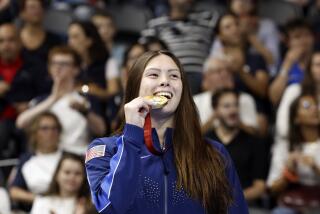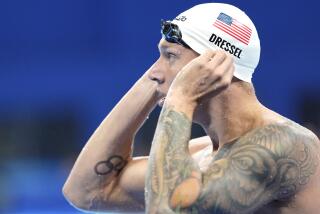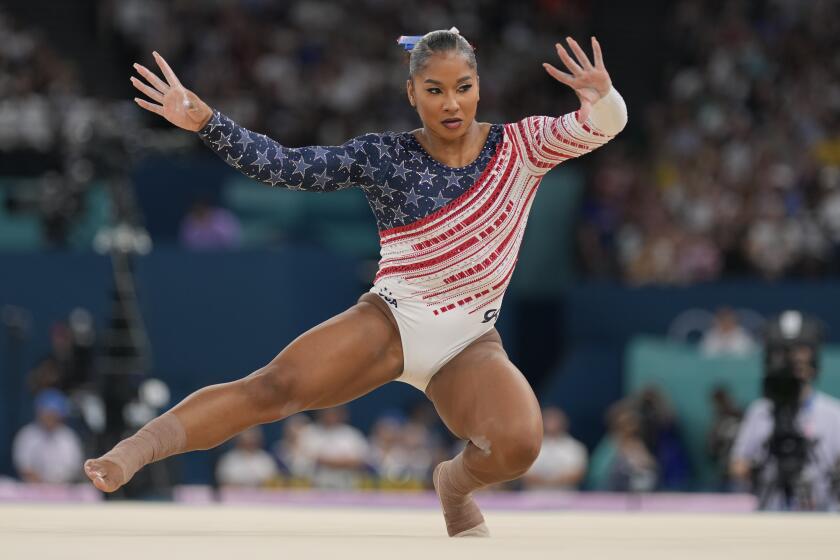Swimmer Jason Lezak goes solo to prepare for Olympic trials
It is a cool, overcast morning in Irvine and 10 swimmers of varying skills are taking a lesson in one corner of the William Woollett Jr. Aquatics Center.
Some bellies hang over the swimsuits and a woman keeps mumbling about getting water in her ear. These aren’t pros or even talented youngsters.
They are in their 20s and 30s and are so different from the solitary man in the fifth lane who has arrived carrying a black mesh bag that holds goggles, a pair of fins, a small parachute and a snorkel that looks like one your 10-year-old might take to the beach.
Jason Lezak is 36 years old and already has four Olympic gold medals to his credit, including two won at the Beijing Games in 2008.
He is still freckled-faced and is the father of two, and he is a solitary trainer at this point in his life.
He sees no need to have a coach barking orders or split times or to give him a complicated yearlong written plan.
After an hour’s workout on a weekday at the pool that is within five minutes of his Irvine home, Lezak said that what he did, including using the fins and the snorkel, was part of a training plan that comes into his head as he stands on the deck on any particular morning.
“It’s what I need then,” Lezak said. “I have it all in my head now from all those years. Why should anyone else know better than me what I need? And why should I need anyone else to motivate me? At this point, if I can’t do it, I shouldn’t bother.”
Besides his Olympic hauls, Lezak also has four world championship gold medals as well as a silver and a bronze.
He was 32 and the oldest man on the U.S. swimming team in Beijing and will be 36 and most certainly the oldest man on the U.S. team in London should Lezak qualify for his fourth Olympics.
So, of course, there is the question.
Why?
The answer doesn’t come in words.
It comes from watching a decorated Olympian practice in anonymity. He takes a gulp from a white squeeze water bottle, does a couple of stretches and dives in. He does some slow freestyle laps, about 10, then the same number of butterfly laps, then he switches back to freestyle.
He wears goggles and he reaches into his bag for a small paddleboard and the flippers. He puts on the flippers and swims only on his right side, kicking then turning and keeping a leisurely pace. These seemingly insignificant movements help him with strength and balance, Lezak said.
After about 25 minutes, Lezak takes his snorkel. He’s still wearing the goggles and the fins. No stranger would walk up and say, “Hey, there’s an Olympic gold-medal swimmer.”
The snorkel, Lezak said, ensures a steady pace of breathing. The flippers keep him on the straight and narrow. “I’m old,” he said. “I can’t do all that pounding, all that mileage. I have figured out how to do the most in a short amount of time.”
He also packs a little parachute that he will attach to his legs to cause drag in the water. It is a way to do strength training, Lezak said.
Despite all his racing hardware, Lezak is most remembered for an Olympic moment that benefited the world’s most famous swimmer, Michael Phelps.
When Phelps was aiming for a record eight gold medals in Beijing, Lezak became a mini-star. It was Lezak who chased down France’s Alain Bernard in the final 20 meters of the 400 freestyle relay to help give the U.S., and Phelps, a gold.
That’s the kind of swimming Lezak churns up when he attaches that parachute to his feet and begins kicking. All of a sudden it’s as if a shark has emerged from the bottom of the pool causing a commotion with splashing and noise. There is method to this as well. “Sudden bursts,” Lezak said. “That’s what a sprinter does.”
Lezak has swum at this pool most of his life. It’s where he grew up. His life now is simple. “Weights in the morning,” he said. “Then the power from the gym, I apply to the pool. I do some resistance swimming, some speed work after that, take that power into real speed.
“As the body gets older, sometimes the mind wants to go hard for a lot longer. But I’ve learned over the course of the last several years how many laps is enough, how many is too much.”
Lezak, of course, has been coached. He worked with Dave Salo, who coaches a bunch of Olympic hopefuls at USC. But that kind of mass practice isn’t for Lezak anymore.
He is married to Danielle, who is a nurse and an ex-swimmer. He has a 21/2-year-old son, Ryan, and a 6-month-old son, Blake. Both have arrived since the Beijing Games, and maybe there were days or weeks when Lezak contemplated retirement but not seriously.
Still, Lezak admits he’s getting nervous as trials approach. “More than ever,” he says. “When I first started going to trials, I knew everything. And that was a bad thing because I’d be in the ready room, looking across and most of the names were of people with American records, national champions, gold medalists, and my self-confidence was great yet I didn’t know if I could beat any of them.
“Now I have the confidence. I’ve put in the work. I’ve beaten people I wasn’t supposed to beat. I started being able to go to races like I could win.”
Lezak says he will occasionally pop in a DVR of that Beijing relay where he helped Phelps.
“It doesn’t seem like it’s me, even after it happened and we won the gold medal,” he said. “I don’t think I realized the impact it made, how people perceived it back home. I started being invited on talk shows. People stopped me at airports. I had been an Olympian two times before but now I got noticed. That’s not my type of personality and I’ve had to adapt.”
Lezak has no desire to be a star. He doesn’t want to be Michael Phelps. He said his favorite race in Beijing wasn’t the relay he helped the U.S. win for Phelps but his individual bronze medal. “I had to dig deep for that. I was 32 years old and my body didn’t recover after the relay. I had to dig deep for that bronze.”
He is also at peace with however the U.S. Olympic trials go. “I’m confident,” he said. “I know I’ve done everything I was possibly meant to do to be the best,” he said. “I want very much to go to my fourth Olympic Games, but if it doesn’t work out, I’ve had a great career.”
twitter.com/mepucin
More to Read
Go beyond the scoreboard
Get the latest on L.A.'s teams in the daily Sports Report newsletter.
You may occasionally receive promotional content from the Los Angeles Times.







